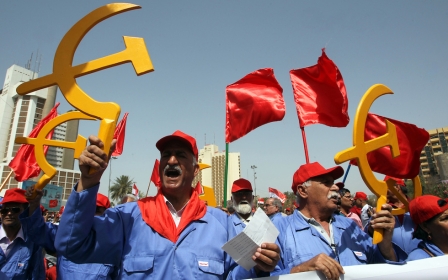Iraq adopts 2018 budget, slashing allocations for Kurds

Iraq's parliament on Saturday adopted an $88.5bn budget for 2018, with Kurdish lawmakers boycotting the vote to protest against a cut in the amount allocated to their autonomous region.
The reduction comes after a controversial independence referendum by the Kurds last year sparked a furious dispute with the central government.
The budget is based on projected oil exports of 3.9 million barrels per day, including 250,000 bpd produced in the Kurdistan autonomous region of northern Iraq, at a price of $46 per barrel.
It projects $77.5bn in revenue and a deficit of $10.6bn, and allocates $20.8bn for investments.
Parliament was meant to pass the budget before the start of the 2018 financial year in January but all three main blocs, Shia Arabs, Sunni Arabs, and Kurds, had serious issues with the government's proposal.
"We boycotted the vote and there are proposals for Kurdistan to withdraw from the entire political process in Iraq over the unfair treatment we have received," said Kurdish MP Ashwaq Jaff.
Kurdish lawmakers boycotted the vote because it reduced Kurdistan's part of the national budget to 12.6 percent from 17 percent.
Article 9 of the Iraqi constitution stipulates that Kurdistan's share of the budget must reflect the size of the population of the autonomous region.
But the text of the budget approved by parliament on Saturday states that the autonomous Kurdish government must export 250,000 bpd and hand over the money it earns from the sales to the federal authorities.
"If Kurdistan does not hand over the money, the finance ministry will take it from its part of the budget," it said.
Iraqi Kurdish Peshmerga forces took control of the northern province of Kirkuk, home to key oil fields, in June 2014 after federal forces withdrew in the face of an offensive by the Islamic State (IS) group.
Late last year, following the Kurdish referendum on independence that was rejected by Baghdad, federal forces recaptured the oil fields, severing a key lifeline for the Kurds whose economy largely depended on oil revenue.
Iraqi parliament speaker Salim Jubburi on Saturday said the 2018 budget had also "resolved" the issue of "salaries for Kurdish civil servants and the Peshmerga".
The federal government will resume paying those salaries, which had been frozen for the past six months amid demands by Baghdad for an audit to determine the number of civil servants in Kurdistan, he said.
Shia lawmakers wanted more spending allocated to the southern oil-producing, predominantly Shia, provinces as well as greater salaries and benefits for the Iran-backed Shia militias known as Popular Mobilisation Forces, who helped Iraq's security forces defeat IS.
Sunni lawmakers wanted more allocated towards reconstructing areas retaken from the militants, which were predominantly Sunni. The areas include Iraq's second city Mosul, which was retaken after nine months of urban warfare.
On Thursday the "three presidencies" of Iraq, its Shia prime minister, Sunni parliament speaker, and Kurdish president, met to discuss how to push the budget through.
Prime Minister Haider al-Abadi congratulated Iraqis over the passing of the budget on Saturday and said it was the result of cooperation between the executive and legislative branches.
The budget also contained some belt-tightening measures as Iraq looks to rebuild after the brutal fight against IS.
It limits the number of cars that can be used for official convoys, including those escorting the president and the prime minister.
Dozens of cars used to escort government officials in Iraq, but under the new guidelines the president and the prime minister will be allotted just five vehicles each.
Government ministers will be allowed three-car convoys and vice presidents two.
Iraq will sell at auction all the other cars that made up official convoys and put the money earned back into the budget.
Iraq ranks as one of the world's most corrupt countries, coming 169th out of 180 in Transparency International's corruption perception index for 2017.
Its economy has suffered from low oil prices and the country is also reeling from the three-year war against IS.
The adoption of the new budget comes weeks after donors pledged $30bn in loans and investment for Iraq's reconstruction.
Iraq has said its 10-year reconstruction plan would cost $88.2bn, of which $22bn was required immediately.
Stay informed with MEE's newsletters
Sign up to get the latest alerts, insights and analysis, starting with Turkey Unpacked
Middle East Eye delivers independent and unrivalled coverage and analysis of the Middle East, North Africa and beyond. To learn more about republishing this content and the associated fees, please fill out this form. More about MEE can be found here.




